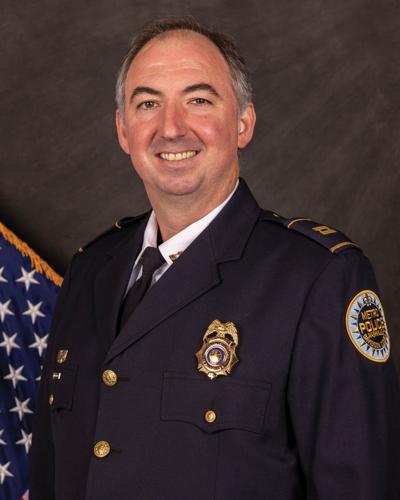The Metro Nashville Police Department debuted its Partners in Care program in 2021, bringing along mental health clinicians on calls involving mental health crises.
On May 1, Nashville’s West Police Precinct announced it would begin offering the co-response model, making it ubiquitous across the city. Partners in Care started in two precincts — Hermitage and North — and has gradually grown. Dispatched through 911, pairs (each made up of an officer and a clinician) respond to calls Monday through Friday, 6 a.m. to midnight.
For Michael Randolph, director of co-response services at Mental Health Coop, the announcement was a touching moment. He’s seen the program through two mayoral administrations, hired and trained dozens of clinicians to work with MNPD and added another co-response model, REACH, with the Nashville Fire Department in February 2023.

Capt. Anthony Brooks
“This has been a goal since we started the pilot,” says Randolph. “And to know that we are able to help people and we have the data to show that we are being effective in this program, it just touches my heart, and I really hope we can continue to strive to do the best we can to help people.”
As of December, Partners in Care had seen a total of 5,248 people with approximately 75 percent connected to care. In 2023 alone, the program saw 2,745 people.
“We learned that we were busier than we thought we would be,” says Capt. Anthony Brooks, head of alternative policing strategies for MNPD. “We did a lot of research before and made some assumptions on how many calls we thought we would go to, and then we got out of the gate and we were a lot busier.”
Brooks says this was because 911 dispatchers have gotten more keen in deciding which calls they’ll send Partners in Care to respond to, and officers have become more likely to invite a mental health clinician to join from the scene.
REACH pilot program releases Q3 results, Partners in Care to expand to all police precincts
The co-response programming is, in practice, meant to help those experiencing homelessness, who are disproportionately affected by mental health diagnoses and also more likely to have the police called on them. Randolph believes the program has been able to benefit that population. For example, about 75 percent of Partners in Care calls in the Central Police Precinct are for unhoused individuals, while that number drops to an estimated 25 percent in surrounding precincts.
“It is very hard right now to get into substance abuse treatment, long-term mental health treatment,” Randolph says. “That’s one of the program goals — to streamline care and communication. I think we’ve been able to do that, specifically with the unhoused. It takes a lot of coordination, a lot of different resources to do it. Having a counselor, you can walk them through to hopefully hand off to all of these great agencies in Nashville that do a really great job helping people. I think we’ve been able to do that.”
Brooks says he’s noticed that officers also benefit from having a clinician around — for their own benefit following mentally taxing calls. The clinicians pick up on that, and encourage officers to seek self-care.
Partners in Care started with officers who volunteered to take part, and now Brooks says his goal is to have every officer receive 40 hours of crisis intervention training.
“The word-of-mouth from the officers has been great,” he says. “If an officer was at a precinct that had [Partners in Care] before and they transferred here, and they’re telling people, ‘It was so great when he had this.’ To be here and have the program at every single precinct is a huge shot in the arm for the way we’re able to service the community whenever they’re experiencing a behavioral health crisis.”





